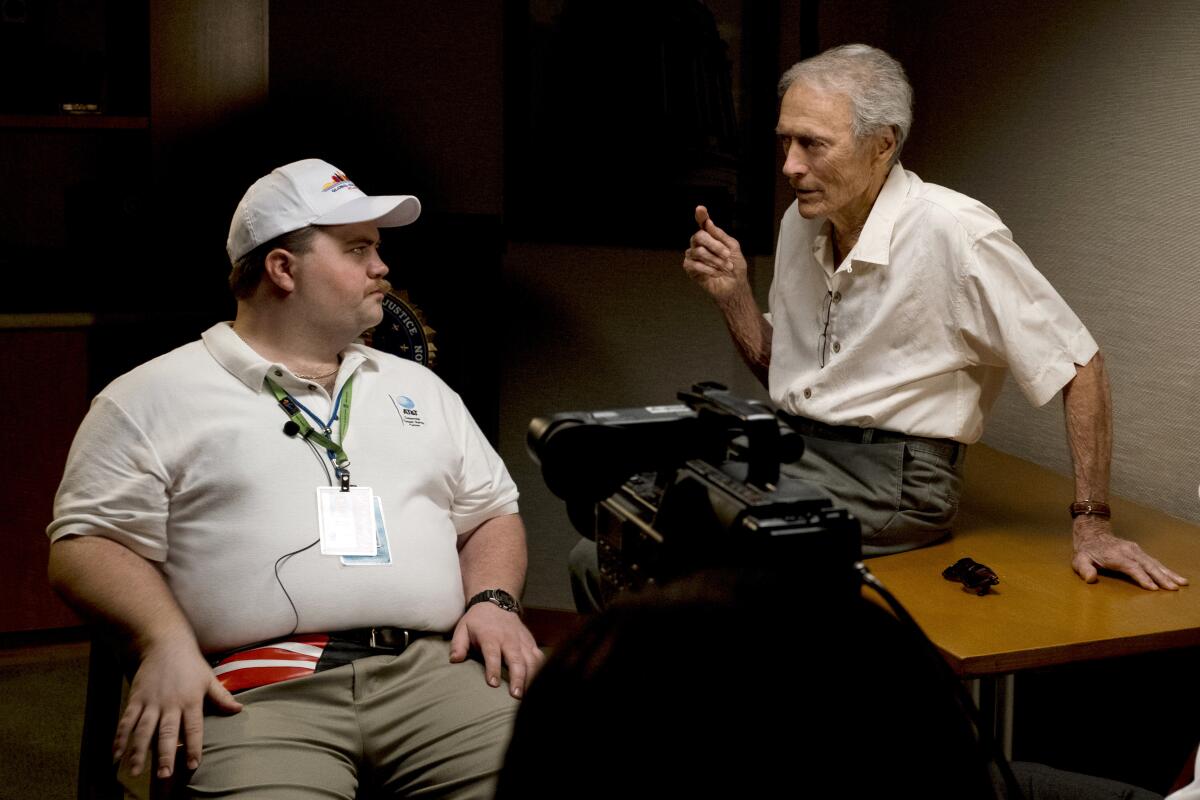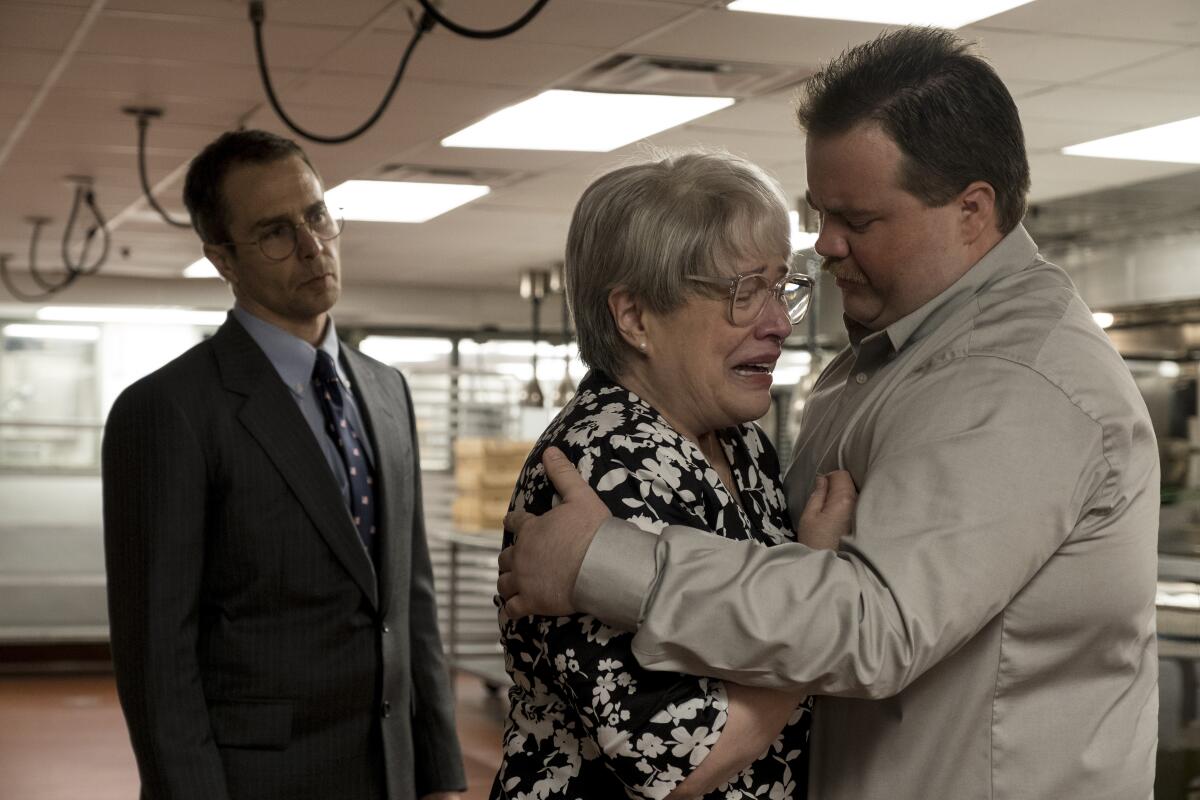A storm is brewing around Clint Eastwood’s ‘Richard Jewell.’ Here’s why

- Share via
With only days left before “Richard Jewell” hits theaters, lawyers for the Atlanta Journal-Constitution and its parent company, Cox Enterprises, have demanded that Warner Bros. slap a disclaimer on the Clint Eastwood film.
At issue is the film’s portrayal of the late reporter Kathy Scruggs. She broke the story that security guard Jewell — at that point a hero for saving countless lives in the Centennial Olympic Park bombing at the 1996 Olympic Games in Atlanta — was in fact the FBI’s lead suspect in the case.
Scruggs, played by Olivia Wilde, is depicted as a wildly unethical journalist who offers to trade sex for information from an FBI agent portrayed by Jon Hamm.
“The AJC’s reporter is reduced to a sex-trading object in the film,” says the letter, which according to the AJC was sent to Warner Bros., Eastwood, screenwriter Billy Ray and others. “Such a portrayal makes it appear that the AJC sexually exploited its staff and/or that it facilitated or condoned offering sexual gratification to sources in exchange for stories. That is entirely false and malicious, and it is extremely defamatory and damaging.”

Another point of contention is the representation of the newspaper’s behavior around the 1996 story. The letter, sent Monday from L.A.’s Lavely & Singer law firm, maintains that the organization “acted responsibly.”
The letter demands a public statement from the studio and those associated with “Richard Jewell” to clarify that artistic license was used in portrayal of events and characters and that some events were “imagined for dramatic purposes.” It also wants a “prominent disclaimer” to that effect added to the movie.
Warner Bros. told Deadline on Monday that those claims are “baseless.” A studio source confirmed to the trade outlet that a disclaimer has always been at the end of the film.
“It is unfortunate and the ultimate irony that the Atlanta Journal-Constitution, having been a part of the rush to judgment of Richard Jewell, is now trying to malign our filmmakers and cast. ‘Richard Jewell’ focuses on the real victim, seeks to tell his story, confirm his innocence and restore his name,” the studio said.
Ray’s screenplay was based in large part on a 1997 Vanity Fair article about Jewell and a new book on the case. The movie, which premiered Nov. 20 at AFI Fest in Los Angeles, is another of Eastwood’s films “depicting the dark side of celebrated heroes,” according to The Times’ Glenn Whipp.
“I’d like a street named after him,” Eastwood said of Jewell after the world premiere. “He deserves even more.”
This week’s newsletter covers the premiere of Clint Eastwood’s “Richard Jewell,” the Spirit Award nominations and all the great movies women directed this year.
The Atlanta Journal-Constitution has had its antennae up for a while regarding “Richard Jewell,” which also stars Paul Walter Hauser as the titular character, along with Sam Rockwell and Kathy Bates.
“I worry about Eastwood’s version of Kathy. It would be so easy to play Kathy as a love interest, as something less than the competent reporter she was. Movies often reduce complex people to types. This leaves little space for nuance,” said Bert Roughton, who was Scruggs’ editor when the Jewell story broke, in a September AJC opinion piece.
Roughton said he had read Ray’s 2015 screenplay and “it gave [him] pause” — both the scene implying a sex-for-information scenario and the script’s flattening of some people into stereotypes. He said he understood that it wasn’t a documentary but also asked, should a film be fair?
Wilde defended her portrayal of Scruggs last week, saying she had an “immense amount of respect” for the reporter, who died in 2001 from an overdose of prescription pain pills. She told the Hollywood Reporter that “by no means” was she intending to suggest that as a female reporter Scruggs needed to use her sexuality.
The actress said people have a hard time accepting sexuality in female characters without letting it define the character entirely.
“I feel a certain responsibility to defend [Scruggs’] legacy — which has now been, I think unfairly, boiled down to one element of her personality, one inferred moment in the film,” Wilde said.
Ron Martz, a former AJC reporter who worked with Scruggs on much of the 1996 bombing coverage, told the Journal-Constitution that she was “one of the better reporters I ever worked with. She was really tough and hard-nosed. When she went after a story she did what was necessary to get the story, within legal and ethical bounds.”
“She was never at peace or at rest with this story. It haunted her until her last breath,” Scruggs’ friend and former coworker Tony Kiss told the AJC. “It crushed her like a junebug on the sidewalk.”
Jewell was publicly cleared by the FBI months after the AJC’s story came out, but not in time to prevent the 88-day media frenzy that enveloped him and his mother, whose house he lived in. Jewell died of complications of diabetes in 2007, at age 44.
“I find it appalling, quite frankly, at how quickly everybody leapt to finger [Jewell],” The Times’ late media writer David Shaw said in a 1996 interview with Atlanta magazine. “To write about it in the context of a larger story about the explosion, down in the sixth or eighth paragraph — that’s one thing. But to bring out a special edition and start leading your newscast and putting out Page 1 stories on it — that’s over the top.”
In 2005, Eric Rudolph pleaded guilty to that bombing and three others. He is currently serving four life sentences without possibility of parole.

After his ordeal, Jewell sued or threatened to sue ABC, CNN, NBC, the New York Post and the AJC/Cox for defamation, as well as his former employer, Piedmont College, which he said gave false information about him to newspapers and the FBI.
Everyone settled except for the AJC, which held its ground. That case was finally tossed in 2011 when the Georgia Court of Appeals affirmed, among other things, that the reporting had been substantially true when it was published.
“Richard Jewell is unquestionably a tragic figure,” the appeals court said in its conclusion, which favored the newspaper. “Here is a man whose valor and quick thinking catapulted him from obscurity to beloved national hero almost instantaneously, who then saw those universal accolades vanish in the blink of an eye. All of a sudden, Jewell was the mistaken villain, forced to endure unfathomable media and law-enforcement scrutiny, as well as rampant media speculation that he may have committed the very crime he had so bravely attempted to thwart. And while Jewell’s good name was eventually cleared, he and his family suffered tremendously as a result of this ordeal. For that, we have the greatest sympathy.
“Nevertheless, for all of the reasons noted supra, we conclude that the trial court did not err in denying Jewell’s motion to compel or in granting the Media Defendants summary judgment on Jewell’s claims.”
“Richard Jewell” will be released in theaters Friday.
More to Read
Only good movies
Get the Indie Focus newsletter, Mark Olsen's weekly guide to the world of cinema.
You may occasionally receive promotional content from the Los Angeles Times.












